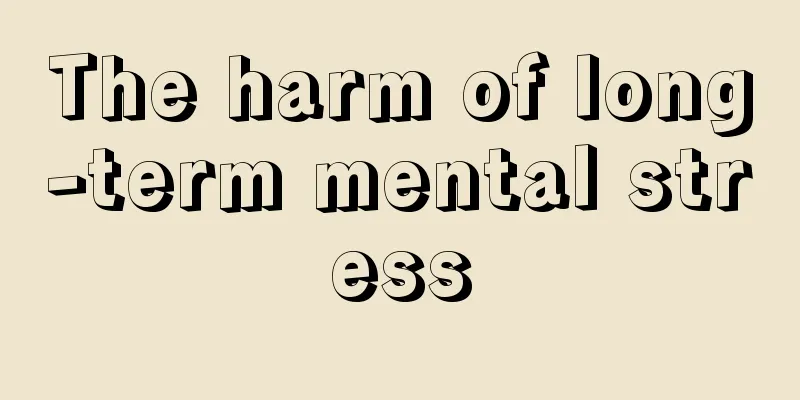The harm of long-term mental stress

|
In today's society, people have to face pressure from life, work, family and other aspects every day. If the pressure is moderate, it will be helpful to a person, but when the pressure exceeds people's psychological endurance, it will be counterproductive. Especially when a person is under relatively high pressure for a long time, he must find ways to relieve the pressure in time. If the pressure is not relieved, it will cause a lot of harm to physical health. Stress and the human body Excessive stress can cause muscle tension, indigestion, increased heart rate, increased blood pressure, constant sweating, cooling of the body, increased blood clots, and the dissolution of sugar and fat into the blood. When stressed, muscles suddenly shift their energy source to “fight off” the perceived threat. The sympathetic nervous system signals the adrenal glands to release hormones such as adrenaline and cortisol. These hormones increase your heart rate, raise your blood pressure, change the activity of your digestive system, and raise your blood sugar. Stress and bad behavior Excessive stress can increase the body's dependence on tobacco, alcohol, tea and coffee, and lead to compulsive behavior. When facing stress, many people resort to smoking, drinking alcohol, drinking coffee and other methods to relieve their emotions, relieve stress and relieve fatigue. Due to both physiological and psychological effects, substances such as nicotine and caffeine can make people feel relaxed and happy. On the other hand, repetitive behaviors can also reduce anxiety, such as snacking and shopping. Such effects will stimulate users to continue to relieve stress by smoking, drinking alcohol, and drinking coffee. However, since nicotine, caffeine, alcohol, etc. are addictive substances, the body develops tolerance to these substances through gradual repeated use, that is, more must be inhaled to achieve the same sense of comfort as before, thus leading to addiction. Stress and emotional cognition Excessive stress can cause inattention, memory loss, decreased comprehension and creativity; frequent worry, irritability and anxiety. First of all, excessive stress makes people feel unhappy, depressed, anxious, painful, dissatisfied, pessimistic and stuffy. They feel that life is boring, their self-control decreases, they suddenly get angry, cry or laugh, their ability to work independently decreases, usually active people become lazy, usually quiet people become emotional, their originally easy-going personality suddenly becomes irritable and they become intolerant and avoid sensory stimulation, and they suddenly become intolerant of music, electric lights, and the conversations of family members or subordinates. Secondly, high stress can easily increase conflicts between people and others, affect work performance, and make people forgetful, fatigued, and less efficient. Furthermore, people with excessive psychological stress may become apathetic and reckless. They may still be able to handle small problems and daily activities, but they cannot face the major issues they are worried about, cannot make normal decisions, and are prone to irresponsible and hasty behavior. Stress and disease According to medical experts, excessive stress can harm the health of seven systems of the human body, including the nervous system, skeletal muscle system, respiratory system, cardiovascular system, endocrine system, gastrointestinal system, and reproductive system. Excessive stress can also cause allergies, asthma, migraines, irritant enteritis, eczema, psittacosis, urticaria, high blood pressure, heart disease and other diseases. Stress and the human heart Failure to release stress can lead to various heart diseases: increased blood lipids, increased blood clots, heart disease, and stroke. Although the stress response is short-lived, it is an acute stress response. Just like when a person is in a crowded traffic, it causes the heart rate to increase and the myocardial contraction to increase. But repeated episodes of acute stress can cause inflammation of the coronary arteries and even lead to a heart attack. Stress and human immunity Studies have found that both long-term and short-term psychological stress can affect the vitality of the immune system. The greater the stress, the fewer antibodies the body produces, and the greater the chance of being infected by the virus. Viruses can cause malignant diseases such as lung cancer, blood cancer, and skin cancer. |
<<: Precautions for using restraint belts
>>: What to do if you feel weak after chemotherapy
Recommend
How to treat sexual frigidity
It is a very happy and comfortable thing to get a...
What is the reason for stomachache after eating pears
Pregnant women should pay special attention to th...
What are the precautions after taking Jingan Capsule
People must first understand their physical condi...
Radionuclide scanning and CT examination can diagnose lung cancer
Imaging examinations for lung cancer include radi...
When should I apply hot compress after double eyelid surgery
Although the double eyelid surgery process is rel...
What are the main treatments for gastric cancer? There are four types
Gastric cancer seriously threatens human health, ...
What food to eat for sore throat
People with sore throats have to pay attention to...
What to do if your voice becomes hoarse
A deepening voice should be a sign of voice chang...
Can you get pregnant if you have colon cancer
Can you get pregnant if you have colorectal cance...
How many years can one live with colon tubular adenoma
Colon tubular adenoma is a tumor with many protru...
The hazards of triple-negative breast cancer
Triple-negative breast cancer refers specifically...
What is the best medicine for hyperthyroidism
Hyperthyroidism is a very disturbing disease that...
Early manifestations of cervical cancer What are the symptoms of cervical cancer?
Early symptoms of cervical cancer: 1. Cervical er...
What does it mean when the half-moon disappears?
As people's living standards improve, everyon...
Why do my feet stink when I wear slippers
In summer, many people's feet sweat a lot, wh...









